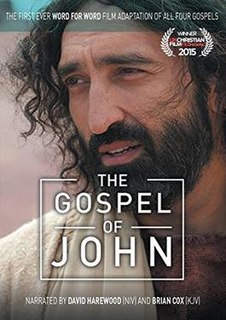The Visual Bible, also Visual Bible Project is the name used by two distinct projects to film, verbatim, books of the New Testament.

The New Testament is the second part of the Christian biblical canon, the first part being the Old Testament, based on the Hebrew Bible. The New Testament discusses the teachings and person of Jesus, as well as events in first-century Christianity. Christians regard both the Old and New Testaments together as sacred scripture. The New Testament has frequently accompanied the spread of Christianity around the world. It reflects and serves as a source for Christian theology and morality. Extended readings and phrases directly from the New Testament are incorporated into the various Christian liturgies. The New Testament has influenced religious, philosophical, and political movements in Christendom and left an indelible mark on literature, art, and music.
The first Visual Bible project produced The Visual Bible: Matthew (1993) and The Visual Bible: Acts (1994) starring Italian-American actor Bruce Marchiano as Jesus. Both films followed the New International Version word for word in the English version, and vernacular Bibles in versions dubbed into Spanish, Cantonese and Mandarin.

The Visual Bible: Matthew is a 1993 film portraying the life of Jesus as it is found in the Gospel of Matthew. The complete Gospel is presented word-for-word based on the New International Version of the Bible. It was directed by South African film maker Regardt van den Bergh and stars veteran actor Richard Kiley in the role of St. Matthew, newcomer Bruce Marchiano as Jesus, and Gerrit Schoonhoven as Peter. Marchiano portrays Jesus as a joyous, earthy, personal man with a sense of humour.

The Visual Bible: Acts is a 1994 Christian film directed by Regardt van den Bergh and starring Henry O. Arnold, James Brolin, Dean Jones, and Bruce Marchiano. It depicts the events of the Acts of the Apostles from the New Testament. All of the dialogue is word-for-word scripture, taken directly from the New International Version of the Bible.

The Italians are a Romance ethnic group and nation native to the Italian peninsula and its neighbouring insular territories. Most Italians share a common culture, history, ancestry or language. Legally, all Italian nationals are citizens of the Italian Republic, regardless of ancestry or nation of residence and may be distinguished from people of Italian descent without Italian citizenship and from ethnic Italians living in territories adjacent to the Italian Peninsula without Italian citizenship. The majority of Italian nationals are speakers of Italian, or a regional variety thereof. However, many of them also speak another regional or minority language native to Italy; although there is disagreement on the total number, according to UNESCO there are approximately 30 languages native to Italy.
The second Visual Bible project produced The Gospel of John narrated by Christopher Plummer and starring Scottish-Peruvian actor Henry Ian Cusick as Jesus. The film followed the text of the Good News Bible. [1] [2] [3]

The Gospel of John is a 2003 epic film that is the story of Jesus' life as recounted by the Gospel of John. It is a motion picture that has been adapted for the screen on a word-for-word basis from the American Bible Society's Good News Bible. This three-hour epic feature film follows John's Gospel precisely, without additions to the story from other Gospels, or omission of complex passages.

Arthur Christopher Orme Plummer is a Canadian actor whose career has spanned six decades, beginning with his film debut in Stage Struck (1958).

Peruvians are the citizens of the Republic of Peru or their descendants abroad. Peru is a multiethnic country formed by the combination of different groups over five centuries, so people in Peru usually treat their nationality as a citizenship rather than an ethnicity. Amerindians inhabited Peruvian territory for several millennia before Spanish Conquest in the 16th century; according to historian David N. Cook their population decreased from an estimated 5–9 million in the 1520s to around 600,000 in 1620 mainly because of infectious diseases. Spaniards and Africans arrived in large numbers under colonial rule, mixing widely with each other and with indigenous peoples. During the Republic, there has been a gradual immigration of European people. Japanese and Chinese arrived in large numbers at the end of nineteenth century.




![Sayings of Jesus on the cross 7 sayings of Jesus in the Gospels: “[…] forgive them, for they do not know […]“; “[…] you will be with me in paradise”; “[…] behold your son […]”; “[…] why have you forsaken me?”; “I thirst”; “It is finished”; “[…]](https://upload.wikimedia.org/wikipedia/commons/thumb/f/f9/Brooklyn_Museum_-_What_Our_Lord_Saw_from_the_Cross_%28Ce_que_voyait_Notre-Seigneur_sur_la_Croix%29_-_James_Tissot.jpg/296px-Brooklyn_Museum_-_What_Our_Lord_Saw_from_the_Cross_%28Ce_que_voyait_Notre-Seigneur_sur_la_Croix%29_-_James_Tissot.jpg)





